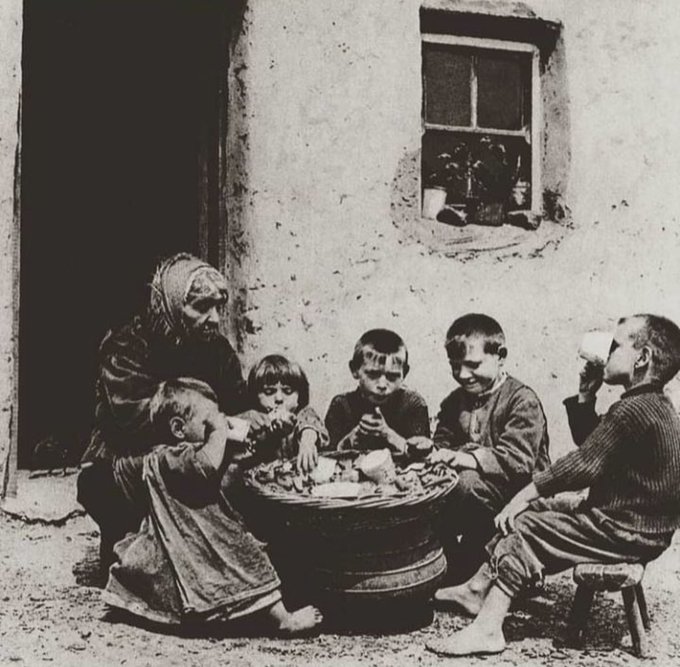Irish Family Eating a Meal of Potatoes and Milk, 1917.
The "Irish" potato is not originally from Ireland but from South America (specifically Peru and Bolivia), where the Indigenous people have been growing it for thousands of years. After the Spanish conquistadors invaded the region during the 16th century, they brought the potato back to Europe where it eventually became a popular food crop by the 19th century.
During the 1840s, a potato blight began to infect all the potatoes throughout Europe. The Irish were hit particularly hard because they almost solely subsisted on potatoes. They were mostly tenant farmers who were allocated a small plot of land in return for working on the lands of their landlords. Potatoes were easy to grow in a small area and were cheap, filling, and less prone to spoilage, so it became the perfect food source for the poor.
At the height of the Irish famine in 1847, the British landowners continued the exportation of food from Ireland to England and Scotland, which only exacerbated the situation. England refused to enact any sort of export ban. Approximately 1 million Irish people died due to starvation.
In the same year, the Choctaw people managed to scrape together $170 (worth $4,800 today) to send to Ireland for famine relief. Just 16 years prior, the Choctaw had been removed from their lands and made to walk the "Trail of Tears" in which as many as 4,000 men, women, and children died due to starvation, disease, and exposure.
The Ottoman Empire also sent ships stocked with food but were turned away by the British. They had to covertly transport their supplies into a small town, 70 miles north of Dublin, in order to feed the starving Irish. Sultan Abdulmeiid I also offered to donate 10,000 British pounds (worth $1.3 million today), but Queen Victoria refused to accept as she had already donated 2,000 British pounds and did not want to lose face. The sultan begrudgingly lowered his offer to 1,000 British pounds.
The wind cuts through my threadbare coat, my fragile body huddled in the grimy alleyway, eyes locked on the posh restaurant across the street. Crystal chandeliers twinkle, laughter rings out, the scent of rich food wafts towards me, an unwelcome reminder of my gnawing hunger.
I clutch the tattered rugs tightly, remnants of a life that was, each thread a memory of little Sammy and Teddy. They're gone now, taken by the cold grip of hunger, their faces forever etched in my heart. Their spirits remain, little whispers on the wind, forever with me.
"Look, Ellie," Sammy's voice, tender as a summer breeze, floats in my ear, "They're eating ice cream, and it's so cold!"
"Yes, Sammy," I respond quietly, a bitter smile crossing my chapped lips. "They're different from us, you see. For them, eating ice cream in winter is an adventure, a luxury."
Teddy, the quiet observer, speaks next, his voice barely above a whisper. "Do they know, Ellie? About us, I mean."
A lump forms in my throat, the unfairness of it all threatening to drown me. "No, Teddy," I reply, my voice a hoarse whisper. "They don't see us."
I feel a cold hand on mine, a phantom touch of comfort. Sammy again. "But you see us, Ellie. You always did."
I nod, hot tears streaming down my face. "I saw you. I see you. And I'm so sorry...I tried to save you, to protect you..."
"You did, Ellie," Teddy interrupts, his voice filled with a wisdom no five-year-old should possess. "It's not your fault."
"But I should've..." I protest.
"Ellie," Sammy's voice is soft, "Remember the stories you used to tell us? About the moon and stars and how they look after lost children?"
I nod, the memory stinging. "Yes, I remember."
"Well," Sammy's voice is growing fainter, "we're with them now. And they'll look after us, just like you did. We're not hungry anymore."
"And we'll look after you too, Ellie," Teddy adds. "You're not alone."
I close my eyes, their words a soothing balm. I am not alone. But I am invisible, just like they were. To the world beyond the alleyway, we don't exist. And yet, we do. We're survivors, battling each day, each moment, trying to find a semblance of hope in this unforgiving city.
As the night deepens, I hold onto their memory, their voices a stark reminder of the world's indifference. Yet, within me, a spark flickers, a determination. My life, however difficult, however unnoticed, is not pointless. For Sammy and Teddy, for all the unseen children of this city, of this world, I will continue. I am their voice, their memory. And one day, I vow, we will be invisible no more.




No comments:
Post a Comment